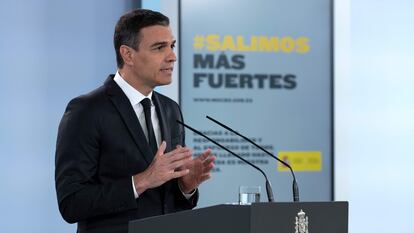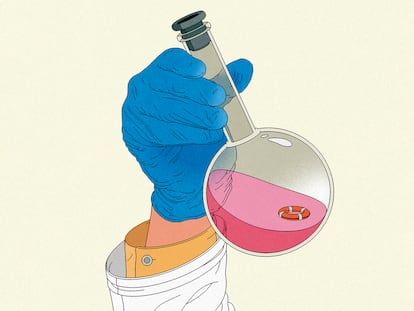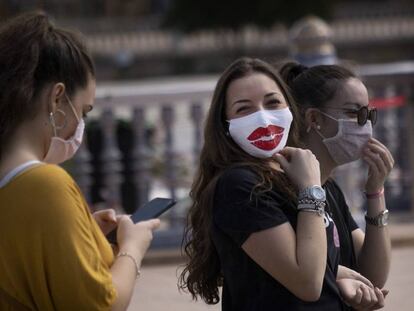Spain’s guaranteed minimum income scheme will reach 255,000 people by June 26, says PM
During a televised address today, Pedro Sánchez criticized cuts made to Spain’s regional healthcare systems, but defended how the system had coped during the coronavirus crisis

The Spanish government is seeking to convey messages of relief not just with regard to the coronavirus epidemic, but also the economy, with a view to starting a cross-party debate as soon as possible on a new budget. Speaking during a televised address on Sunday afternoon, Prime Minister Pedro Sánchez announced that his coalition government is making an unprecedented effort to supply the country’s regions with a €16 billion fund to be spent on health and education in the wake of the coronavirus crisis.
The Socialist Party (PSOE) leader also stated that on June 26, a total of 225,000 people will start to receive payments from the new guaranteed minimum income scheme, a measure that had been agreed on by the party and its coalition partner Unidas Podemos when they signed their governing deal before forming a government, but which has since been fast tracked given the effect that the coronavirus crisis has had on the economy and the most vulnerable members of society.
Sánchez was in a different mode today, focusing more on emerging from the toughest part of the crisis and with more of a view on what went wrong
Sánchez explained that half of these recipients are minors, and that there have already been 21 million visits to the website that has been set up for the star policy of the coalition government, suggesting that there is a lot of interest among citizens who need the financial assistance given the economic crisis caused by the coronavirus confinement measures.
In contrast with previous televised addresses, Sánchez was in a different mode today, focusing more on emerging from the toughest part of the crisis and with more of a view on what went wrong and what can be improved in the future. In this respect, the prime minister was particularly critical of the Spanish regions that have made major cuts to healthcare funding in recent years.
While he didn’t name names, the PSOE has often referred to the Madrid region – which has long been governed by the conservative Popular Party (PP) – as an example of an area that has made most cutbacks. Sánchez rejected the idea that the Spanish healthcare systems – which are devolved to the country’s 17 regions – are worse than was thought.
“It’s just the opposite,” he said. “Spanish healthcare is even better than we thought, but we have discovered that it wasn’t being cared for as it deserved to be. We have seen the reaction when resources are injected, but we have also seen the wounds left behind by the cuts. No economic circumstances justify the mistreatment of our health system. That makes us weaker. It’s the same for science. Society will demand a country in which science and research are strategic sectors,” he said.
The prime minister also expressed his support for his interior minister, Fernando Grande-Marlaska, who has been under fire for sacking a Civil Guard colonel named Diego Pérez de los Cobos. “Mr Marlaska has the right to choose his team, and he wants to modernize it,” Sánchez stated, echoing the minister’s claims that Pérez de los Cobos had been fired as part of a reorganization plan, and not due to the law enforcement agency’s report into the March 8 Women’s Day marches, which were authorized by the central government despite the looming coronavirus crisis. 8-M, as the day has come to be known, has been constantly used by the political opposition since to attack the government’s handling of the crisis, with claims that they let the demonstrations go ahead despite knowing the dangers of contagion.
Asked by journalists about his coalition partner Unidas Podemos, and whether the leftist party was creating an environment conducive to a coup d’etat – a reference in particular to party chief Pablo Iglesias’s accusations against far-right Vox of wanting to overthrow the government – Sánchez offered an ambiguous response. “This is a solid state,” he said, in reference to Spain. “Its institutions work, the Civil Guard has our confidence. And if there are any elements that stray from that, they are not compromising their institution, but rather themselves,” he said, leaving the possibility open that there may be elements taking irregular actions, but that this was not a widespread phenomenon.
Appeal to youngsters
Prime Minister Sánchez also launched an appeal to youngsters in Spain to observe the measures aimed at preventing new outbreaks of the coronavirus. “I am begging you, do it for yourselves and for everyone else,” he said, after having warned that “the risk is still out there,” and that the virus “could return.”
With regard to the reopening of European borders, Sánchez said that “we believe that it should be [the European Union] that leads a coordinated operation.” The Spanish government has previously stated that overseas visitors will be able to come to Spain from July 1, but the details of that measure are yet to be confirmed.
The prime minister was also asked about Spain’s excess mortality figures, which show that 47,000 extra deaths were registered from March to the end of May, compared to the 27,135 official coronavirus death toll cited by the Health Ministry, based on fatalities where PCR tests were carried out and confirmed Covid-19. “The data from the [National Statistics Institute] and the Carlos III Institute are complementary to those from the Health Ministry, not contradictory,” he argued. “When we overcome the pandemic we will be able to know what the fatality rate has been. We need time to fit together the information. The government cannot be accused of lacking transparency.”
English version by Simon Hunter.









































